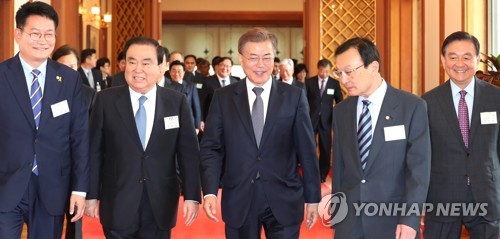President Moon Jae-in's special envoys began embarking on trips Wednesday to discuss possible summit talks between the new South Korean leader and his counterparts in the United States, Japan, China and Russia.
Rep. Moon Hee-sang of the ruling Democratic Party headed to Tokyo where he was expected to meet with top Japanese leaders, possibly including Prime Minister Shinzo Abe.
Moon's special envoy to the United States was set to depart later Wednesday while a special envoy to China will fly to Beijing on Thursday, according to officials from the presidential office Cheong Wa Dae.
Departures by the presidential envoys to Russia and the European Union are scheduled for next week or later, they added.

Most of the special envoys were named shortly after Moon's telephone conversations with the leaders of their host nations, during which he promised additional discussions over summit talks and other urgent issues, such as North Korea's provocations.
The special envoy to Japan was widely expected to focus on bilateral issues, rather than a summit.
The relationship between South Korea and Japan deteriorated after Tokyo recalled its chief of its diplomatic mission and consul general in protest against the erection of a statue symbolizing Korean victims of sexual slavery by the Japanese military during World War II.
Japan argued the erection of the statue violated the countries' 2015 agreement, which it claims has given it a clean slate from its war atrocities in exchange for the 1 billion yen (US$8.8 million) it will provide under the agreement to a support group for Korean victims of sexual slavery.
The Japanese ambassador and consul general returned here early last month after nearly three months.
Moon, however, has repeatedly stressed a need to at least renegotiate the 2015 agreement with Tokyo throughout his election campaign.
During his telephone conversation with the Japanese prime minister following his election and inauguration last week, the new South Korean president flatly laid out that most of his people could not accept or agree with the agreement signed by the former conservative Park Geun-hye administration.
Instead, he urged Abe to honor previous statements released by former Japanese leaders, such as Yohei Kono, who had acknowledged and apologized for Japan's wartime sexual slavery of Asian women, according to Yoon Young-chan, Moon's chief press secretary.
Still, the new South Korean president has also stressed the need for increased cooperation between Seoul and Tokyo to deal with the communist North.
"(President Moon) said he saw a need for the two countries to work together and wisely overcome historical disputes, including the comfort women issue, while separately continuing their joint efforts to deal with the North Korean nuclear issue," Yoon said earlier.
Hong Seok-hyun, a special envoy to the United States, was also set to leave for Washington later Wednesday.
The former ambassador to the United States was expected to fine-tune the agenda and schedule for a summit between Moon and his U.S. counterpart Donald Trump already set to be held in Washington next month.
The South Korean president is also sending special envoys to China and Russia.
A special envoy to the European Union was set to double as an envoy to Germany. The president has also named Archbishop Kim Hee-joong as his special envoy to the Vatican. (Yonhap)

